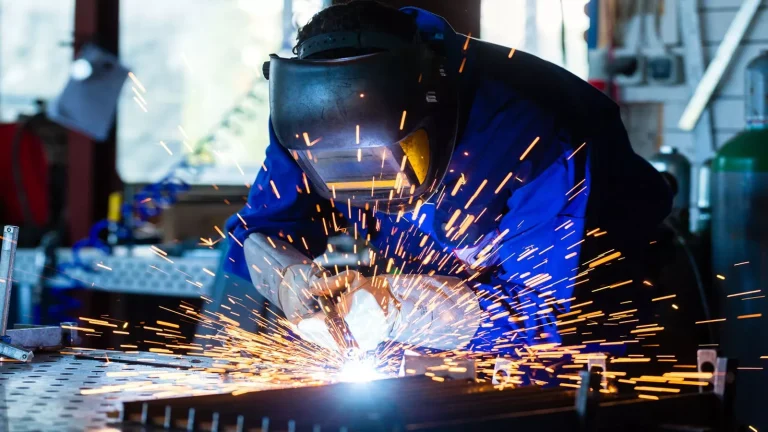Heavy metal fabrication is the backbone of large-scale industrial progress. From power plants and petrochemical facilities to bridges and structural steel components, the durability and performance of fabricated products depend heavily on the materials used. At Boardman Inc., we understand that selecting the right metal isn’t just a technical choice — it’s a strategic decision that impacts everything from structural integrity to project lifespan and compliance. In this article, we’ll explore the most common metals used in heavy metal fabrication, what makes them ideal for demanding applications, and why these materials matter more than ever in modern engineering.
What Is Heavy Metal Fabrication?
Before diving into materials, let’s briefly define heavy metal fabrication. This sector of metalworking focuses on large, complex structures and components made from thick, heavy-gauge metals. Unlike light fabrication — which typically involves smaller parts and thinner sheets — heavy metal fabrication deals with:
- Pressure vessels
- Heat exchangers
- Structural steel beams
- Industrial tanks
- Large-scale piping systems
The stakes are high: strength, corrosion resistance, heat tolerance, and weldability are critical factors. Choosing the right metal for the job is where true expertise shines.
1. Carbon Steel: The Workhorse of Heavy Fabrication
Why it’s used:
Carbon steel is a favorite in heavy metal fabrication due to its strength, availability, and cost-effectiveness. It comes in various grades (low, medium, and high carbon), each offering different balances of hardness, toughness, and machinability.
Common applications:
- Structural supports
- Frames and chassis
- Heavy machinery parts
At Boardman Inc., carbon steel is often used when high tensile strength and affordability are key requirements.
2. Stainless Steel: When Corrosion Resistance Counts
Why it’s used:
Stainless steel offers exceptional corrosion resistance, particularly in harsh environments like marine, chemical, or food processing industries. It’s available in several grades, including 304 and 316, known for their durability and ease of fabrication.
Common applications:
- Chemical processing tanks
- Food-grade piping systems
- Components exposed to moisture and chemicals
In projects where longevity and hygiene are priorities, stainless steel is a go-to material for our fabrication team.
3. Aluminum: Lightweight and Strong
Why it’s used:
While not always associated with “heavy” fabrication, aluminum is increasingly used in projects that demand both strength and weight reduction. It’s corrosion-resistant and easier to machine, weld, and form.
Common applications:
- Structural components for transportation
- Pressure vessels where weight is a concern
- Aerospace and marine industries
Aluminum’s thermal conductivity also makes it ideal for specialized industrial uses like heat exchangers.
4. Alloy Steel: Strength Meets Versatility
Why it’s used:
Alloy steel includes elements like chromium, nickel, and molybdenum to improve mechanical properties. These additions make it more durable, heat-resistant, and suitable for extreme service conditions.
Common applications:
- Boiler components
- Pressure vessels in the energy sector
- Components in high-stress industrial environments
At Boardman Inc., we often recommend alloy steel for critical applications where standard carbon steel may fall short.
5. Nickel Alloys: For the Harshest Conditions
Why it’s used:
Nickel-based alloys like Inconel and Hastelloy are designed to withstand high heat, pressure, and corrosive chemicals. They’re more expensive, but necessary for specialized industries such as oil & gas and nuclear power.
Common applications:
- High-temperature pressure vessels
- Corrosive chemical processing systems
- Turbine and exhaust components
These alloys require skilled fabrication teams and specialized equipment — which Boardman Inc. is proud to provide.
Why Metal Selection Matters in Heavy Metal Fabrication
Using the wrong metal in a heavy-duty application can result in:
- Structural failure
- Costly downtime
- Safety violations
- Reduced equipment lifespan
That’s why our engineers at Boardman Inc. work closely with clients to evaluate not only mechanical demands, but also environmental conditions, budget constraints, and long-term performance expectations. Whether it’s building massive heat exchangers or ASME-certified pressure vessels, we tailor every project around the metal that best matches the job.
Final Thoughts
In heavy metal fabrication, metal selection isn’t just a technical detail — it’s the foundation of quality and reliability. Each project has unique demands, and choosing the right material plays a pivotal role in its success. At Boardman Inc., we bring decades of experience in fabricating large, mission-critical equipment across power generation, petrochemical, and industrial sectors. Our deep knowledge of metal properties, welding techniques, and industry compliance ensures that every component we produce performs as expected — and often, beyond.
Need help with your next heavy fabrication project?
Contact Boardman Inc. today to learn more about our capabilities and how we can help you choose the right materials for the job.

